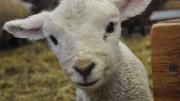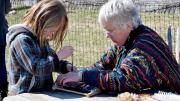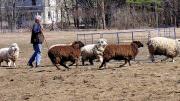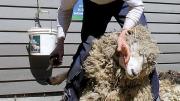The 206-acre Drumlin Farm Wildlife Sanctuary in Lincoln is Mass Audubon’s only working farm-cum-educational center. Staff members tend livestock and bountiful vegetable and flower crops while safeguarding meadow, woodland, and pond habitats, and providing refuge for injured or orphaned wildlife—turkey vultures, red-tailed hawks, barred owls, a great horned owl, pheasants, and a fisher. “Ms. G,” the Commonwealth’s official state groundhog, also resides on site, but is generally not on public view.
The farm’s annual Woolapalooza festival on March 26 supports these efforts to highlight the interconnection among animals, people, and the natural world. Twenty-six ewes will be freed from their winter coats, some just weeks after giving birth. (Seventeen appeared to be expecting at press time.) The rest of the celebratory day is filled with herding-dog demonstrations and farm-life and arts activities. Artisans also demonstrate how raw wool is washed, carded, spun, and eventually turned into sweaters. “Many people think of farms as being active only when everything is green and growing,” sanctuary director Renata Pomponi says, “but there are exciting things going on all year round in nature. One of the important ways New England farmers use the winter is for other ‘crops’ like maple syrup and products like wool.” At Woolapalooza, visitors can buy farm-tapped syrup, along with a lunch of farm produce and meat. All the barns will be open, as well as the four miles of walking trails (weather permitting), because by late March, as Pomponi notes, “People are really ready to get outside again after a cold, long winter.”
For those who shun crowds (and Woolapalooza has drawn thousands of visitors in the past), Drumlin Farm is also open daily. Classes and events include workshops on fermenting foods, making cheese, and running a chicken coop; night walks in search of owls; exploring the biological life of small ponds, and the fundamentals of Northeastern birding.












